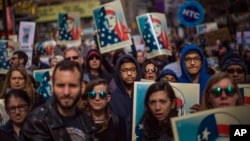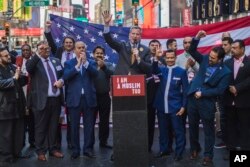Fewer Muslim Americans were involved in acts of violent extremism last year, despite fears that the Trump administration’s hard-line policy on terrorism could set off a backlash from Muslim militants and lead to further acts of violence at home and abroad, a new report shows.
The number of Muslim Americans charged, convicted or associated with violent extremism dropped to 33 in 2017, down from 46 in 2016 and 81 in 2015, according to "Muslim-American Involvement with Violent Extremism, 2017," an annual study conducted by University of North Carolina sociology professor Charles Kurzman.
An advance copy of the 2017 report, to be released Thursday, was provided to VOA.
In an interview, Kurzman said the drop was not necessarily the result of any Trump administration policies. Instead, he said, it was an extension of a downtrend that started during the first half of 2015 when the United States escalated its military campaign against the self-declared Islamic State. Another factor, Kurzman added, was Turkey's decision to close its borders to foreign fighters traveling to Syria and Iraq.
"Even though we’ve seen the Trump administration deride and mock the previous administration’s policies, in practice, what we’re seeing is the same," Kurzman said.
Four US plots
According to the report, a little more than half of the 33 Muslim American terrorism cases recorded in 2017 involved individuals traveling or attempting to travel overseas to join terrorist groups. Four were accused of plots against targets in the U.S., while two cases involved unknown targets.
The domestic plots involved "unsophisticated attempts at murder," carried out mostly by lone operators, belying fears of terrorist networks operating in the United States.
In the deadliest attack carried out by a so-called lone wolf, Sayfullo Saipov, an immigrant from Uzbekistan, drove a truck down a bike path in New York City in October, killing eight people.
17 deaths
In all last year, terrorist attacks carried out by Muslim Americans killed 17 people, raising the number of deaths caused by Muslim American extremists since the attacks of Sept. 11, 2001, to 140, according to Kurzman’s research. During the same period, the report notes, there were about 260,000 murders in the U.S.
"It’s been interesting to see this decline because the numbers have gone down, and our fear and anxiety has remained high, and even climbed higher, in part because of President Trump’s campaign, which highlighted incidences of violent extremism and other political campaigns," Kurzman said.
A 2017 Pew Research survey found that 72 percent of Americans were somewhat to very concerned about Islamic extremism.
Federal report
The findings come on the heels of a report released Tuesday by the departments of Justice and Homeland Security that said 3 out of 4 people convicted of international terrorism under the administrations of former presidents George W. Bush and Barack Obama were foreign born.
The report, issued in response to Trump's second travel ban, said that 402 of 549 individuals convicted of international terrorism-related charges between Sept. 11, 2001, and Dec. 31, 2016, were born overseas. Of the 549 convicted individuals, 147 were U.S.-born citizens; 148 were foreign-born, naturalized citizens; and 254 were not U.S. citizens.
Among several cases highlighted in the report were individuals born in Somalia and Syria — two of the six majority-Muslim countries that are currently on the Trump administration’s controversial travel ban.
In a tweet Tuesday, Trump heralded the report, saying "we need to keep America safe, including moving away from a random chain migration and lottery system, to one that is merit-based."
Senior administration officials also used the report to underline the dangers of current U.S. immigration policies to national security and to push for tougher restrictions.
"This report reveals an indisputable sobering reality — our immigration system has undermined our national security and public safety," Attorney General Jeff Sessions said in a statement accompanying the report.
Saying the report represented "only the tip of the iceberg," Sessions said that there are terrorism-related investigations against thousands of people in the U.S., including hundreds who’ve come to the United States as refugees.
Homeland Security Secretary Kristjen Nielsen, testifying before a Senate panel on Tuesday, called the findings "chilling."
“Without legislative change, DHS will continue to see thousands of terrorists a year attempt to enter the United States, and while we must be right every time, the terrorists only need to be lucky once,” Nielsen warned in a statement.
Critics: Threat exaggerated
Critics of the administration’s frequent association of immigration with terrorism blasted the report as an exaggeration of the threat of terrorism to the United States, noting that it overlooks numerous domestic terrorism cases.
The "report relies on skewed, conclusory data to overstate the threats that immigrants pose to our nation’s security," said Jonathan Smith, legal director of Muslim Advocates, an advocacy group.
"Like the Muslim ban itself, the true intention of this report is to stir up fears about Muslims by relying on debunked tropes and stereotypes," Smith said.






